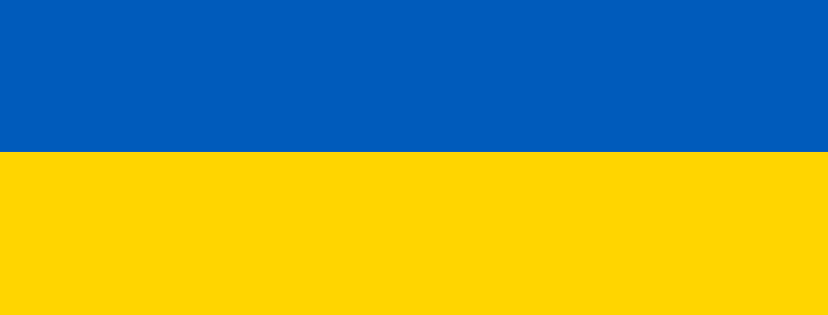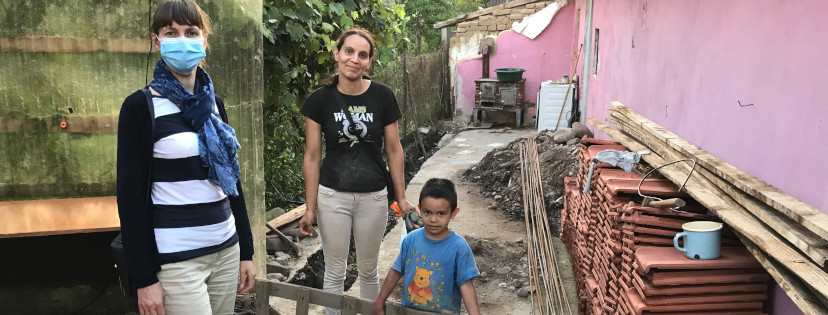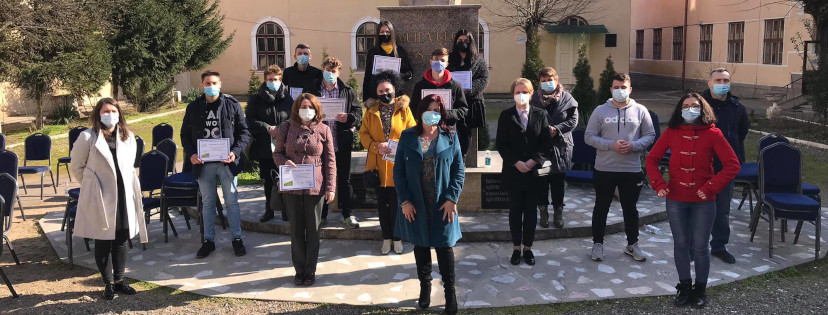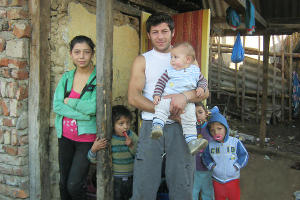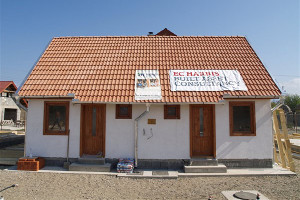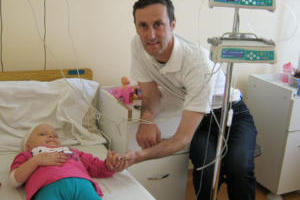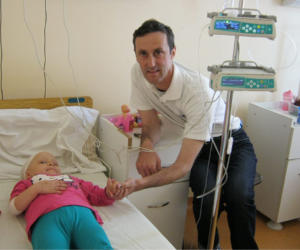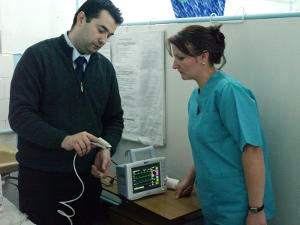Help a homeless orphan with no income to live decent and safe life. Contribute towards this program that provides shelter, food and social services.
- $135 USD can buy 3 meals per day up till he finds a job
- $55 USD can pay a rent in town for an orphan without a shelter while $16 USD can pay his utilities per month;
- $250 USD social services/month
After communism collapsed in Romania in 1989, the orphans were still forced to leave the orphanage when they turned 18, but the government no longer provided them with job assistance. As a result, the orphans often became homeless and wandered the streets without a job, a family or hope. Many were living in parks, under bridges, unfinished buildings, train stations, lives that led to stealing or prostitution.
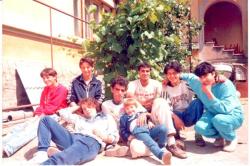 After leaving the orphanages the orphans face diverse difficulties and go through major life risks while trying to find their place in real life. Usually they need support to reconcile with the past and the rejection from their natural families who abandoned them due to poverty and lack of education and gain skills to be able to live on their own. Our goal is to substitute as much as we can the family they do not have. We offer them a shelter and provide them with food while trying to find the appropriate job according to their qualifications and talents. Some of them receive additional vocational training or qualification through our educational program in order to be able to grow professionally. They also receive advice how to keep their job and manage well their income.
After leaving the orphanages the orphans face diverse difficulties and go through major life risks while trying to find their place in real life. Usually they need support to reconcile with the past and the rejection from their natural families who abandoned them due to poverty and lack of education and gain skills to be able to live on their own. Our goal is to substitute as much as we can the family they do not have. We offer them a shelter and provide them with food while trying to find the appropriate job according to their qualifications and talents. Some of them receive additional vocational training or qualification through our educational program in order to be able to grow professionally. They also receive advice how to keep their job and manage well their income.
GH, one of the first two girls taken under the organization’s care, remembers, “One day I and a group of other teenagers were asked to leave the orphanage on the next day. When we left, we didn’t have anything - neither clothes nor even a mattress to sleep on. The teachers didn’t offer us any advice as to what we were supposed to do. It was very hard. I stayed on the streets for about 2 months. I started working here and there taking small jobs, but didn’t have anywhere to sleep. There was a group of us living on the streets, staying together. This continued till I met LK, an orphan like me. He told me then: “Do you know the Ciorna family? Let me bring you to Mrs. Ciorna.” When we went there I received some money and could buy some food. On the second day after talking to Adrian I got accommodated in their house. Later Mother Maria taught me how to cook. I could stay there 2 years and could find a job.”
Today, Good Samaritan continues its mission of providing disadvantaged youngsters from state and private orphanages with the skills and opportunities to socially and professionally integrate into society, while showing them Christian love, care, support and Jesus Christ’s model for living extending its experience of so far 20 years to other communities too.
 After leaving the vocational programs, orphans were helped to find a job and rent a place. Since very few people in town were willing to rent to them due to prejudices, Good Samaritan sought to provide them with a shelter renting to them some of its premises at a lower cost. But it was impossible to shelter everybody. The orphans were then forced by the given circumstances to rent at relatively high cost whatever was available, often in substandard conditions: no heating, toilet in the courtyard, lack of running water or a kitchen. This need of theirs has led to the birth of our construction program.
After leaving the vocational programs, orphans were helped to find a job and rent a place. Since very few people in town were willing to rent to them due to prejudices, Good Samaritan sought to provide them with a shelter renting to them some of its premises at a lower cost. But it was impossible to shelter everybody. The orphans were then forced by the given circumstances to rent at relatively high cost whatever was available, often in substandard conditions: no heating, toilet in the courtyard, lack of running water or a kitchen. This need of theirs has led to the birth of our construction program.
As such, our organization has built homes and bought and renovated apartments that were given to orphans and their families, with mortgage at no interest and no profit. These dwellings are home to young adults who have exited the orphanage and passed through the vocational programs of the organization and currently have permanent jobs. So far we have provided shelter for 52 orphans and their children in 26 homes.
We have decided to partner with housing charities to build homes in the future rather than building ourselves to maximize our ability in solving this issue. As part of this strategy plan, we aim to build homes for orphans around the country in partnership with Habitat for Humanity, as well as with other similar housing charities in Romania and in neighboring countries like Bulgaria, Ukraine and Moldova.
If you would like to partner with us, this is how you can do that:
- Donate for the purchasing of land. A sq. m. of land (10.76 sq. feet) in a good location with all utilities available costs about $42. The most cost effective piece of land to start new building should be of an average size of 7,532 sq. feet. Thus the amount of $ 29,400 can be used for the building of approx. 6 homes.
- Donate for the purchasing of construction materials or make in-kind donations.
- Volunteer on the construction site. You can come with colleagues of yours for the purpose of team building. Read more about how you can become a volunteer.
Good Samaritan has created a health fund for its clients. Our clients are representing the low-income families (families of orphans and underprivileged families at risk of child abandonment).
The state paid medical services (covered by the medical insurance) are mainly offered in old, state-run hospitals, where the equipment is insufficient or morally old. In most of the cases in order to put a sure diagnosis or do complicated surgeries/treatments. More complicated medical consultations are usually requiring modern equipment which can be found in private medical practices, where prices are prohibitive for the major part of the population. Certain medicines are partially or fully compensated for children and chronically sick, pensioners that have medical insurance paid. The categories of people Good Samaritan wants to help are usually with minimum salary that can barely provide for their basic needs let alone to cover expensive medical tests, consultations, medicines, surgeries or rehabilitation. In some fewer cases the beneficiaries have no income.
Being ill in Romania today is a worrying situation if you do not have the financial means and contacts to get access to treatment. Treatments often require long waiting times and additional payments and/or “under the table” payments.
Good Samaritan's health fund supports our clients in:
- Liaising between them and the provider of medical services
- Paying for periodical tests/consultations for the chronically sick, surgeries when needed, as well as post-operational treatment and physiotherapy
- Purchasing of medicines
So far through the medical program have been helped more than 60 orphans and young people from low- income families with different medical problems. They also were enrolled in the program for full medical checks and treatment of chronic diseases.
Some extra services will be offered to the families of handicapped children – financial support for psychological help, wheelchairs, medicines, etc.
A medical sponsorship depends on the seriousness of the disease, the treatment needed and the medication prescribed. It varies between $100 quarterly up to $600 as a single payment for special treatments/medical tests or surgeries.
Good Samaritan often uses the public hospital services for its beneficiaries. To better serve them indirectly leads us in seeking to improve the quality of the medical services offered in state hospitals which are often underfunded and hardly can retain good quality medical staff. This is achieved through the provision of new or second hand functional medical equipment.
While many medical services in our town and country have improved relative to the 1989 situation, they are far behind most of the other European countries plus there is still a mentality of entitlement rather than care and service among some medical staff. Adding to that the underpayment of the sector, migration in droves of the qualified staff towards the west and prejudice, one realizes it is harder for orphans to obtain proper attention and care in the system.
Investments like the one we obtained through a grant from Alcoa Foundation bring Good Samaritan’s youngsters as well as the organization in a better light. We partnered with the local “Nicolae Popovici” Municipal Hospital in obtaining a comprehensive list of equipment which we kindly ask you to consider reviewing. Upon your request we can provide a wish list.
What We Do
- Social and professional integration
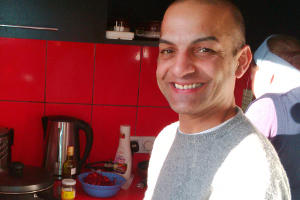 - emergency support (food and shelter) for the ones leaving the institutions or having difficulties after losing a job and transiting to another; life skills training (hygiene, nutrition and health, cooking, money management, communications skills, career development); support for issuing/renewing of identity papers – for the ones with no permanent address and no home of their own; development of institutional culture, understanding legislation, etc.
- emergency support (food and shelter) for the ones leaving the institutions or having difficulties after losing a job and transiting to another; life skills training (hygiene, nutrition and health, cooking, money management, communications skills, career development); support for issuing/renewing of identity papers – for the ones with no permanent address and no home of their own; development of institutional culture, understanding legislation, etc. - Child abandonment prevention program - material support for the families identified to be with higher risk of abandonment
- Educational program
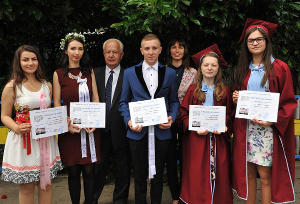 —school and kindergarten support for the orphans’ children, orphans in institutions, children from low-income families, school assistance (books, bags,etc.), financial support for the graduation of a vocational training, support for the graduating of high school /college—for talented students with reduced or no means; college support for orphans and talented students from low income families; special talents development for students with special talents.
—school and kindergarten support for the orphans’ children, orphans in institutions, children from low-income families, school assistance (books, bags,etc.), financial support for the graduation of a vocational training, support for the graduating of high school /college—for talented students with reduced or no means; college support for orphans and talented students from low income families; special talents development for students with special talents. - Housing program—renting premises to orphans at a low price; building of houses (in partnership with Habitat for Humanity and other similar charities) for orphans and their families who can pay them back with no interest or profit for a period of maximum 20 years.
- Medical and dental care program;
- Modernizing of state hospitals program






